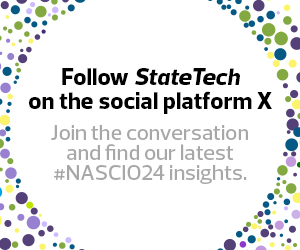It’s time to embrace the next technological frontier: generative artificial intelligence. GenAI is already a staple in the lives of millions, simplifying personal and professional tasks. But as it evolves at a breakneck pace, there’s a risk that those who could benefit the most from GenAI, particularly individuals with disabilities, might be left behind.
In the United States, 13% of the population lives with a seen or unseen disability. The number of disabled people in the workforce increased from 21.3% to 22.5% between 2022 and 2023, a trend expected to continue. GenAI, a burgeoning technology, may further transform accessibility for disabled individuals in work and daily life.
Click the banner for our latest coverage of NASCIO 2024.
State CIOs are at a pivotal juncture on the GenAI frontier, as the Justice Department’s new guidelines for web and mobile app accessibility come into effect after many state governments have already begun to use GenAI in daily operations. Success in harnessing and maximizing GenAI’s potential to increase accessibility for disabled individuals lies in understanding its limitations, detailed in NASCIO’s “Revolutionizing Assistance: How States Can Improve Generative AI’s Role in Disability Empowerment.”
AI Solutions Must be Effective, yet Sensitive
A recent study by the University of Washington characterizes the challenges people with disabilities face when leveraging AI for more accessible lives. GenAI simplifies tasks but can also produce errors, and it lacks a human touch.
In the study, AI tools helped a user with a cognitive disability summarize texts, but it sometimes misrepresented the content. Another user with autism found GenAI useful for drafting messages, yet the results felt impersonal.
RELATED: AI is poised to improve the citizen experience.
Moreover, the study exposed GenAI’s shortcomings, such as insufficient customization for diverse needs; for example, when assisting a user with aphantasia — the inability to picture things in your mind — the result was biased and unrealistic depictions. These findings emphasize the need for state governments to choose GenAI solutions that are not only effective but also sensitive to the varied experiences of disabled citizens and employees.
Here are four things to consider when choosing AI to create more accessible spaces for people living and working with disabilities:
1. Ensure Inclusive Evaluation of AI Tools
State governments must actively involve disabled people in testing GenAI tools to create digital experiences that are truly inclusive. This engagement is vital for understanding the unique challenges and requirements of disabled users. Such collaboration can lead to more human-centered design initiatives and more efficient digital citizen services that benefit everyone.
2. Combat AI Bias With Inclusive Data Sets
Utilizing data sets that accurately represent the disabled community is essential to prevent AI bias and ensure equitable service for all citizens. Inclusive data sets help GenAI models understand and cater to a wide range of disabilities, avoiding the one-size-fits-all approach that can marginalize individual needs.
DISCOVER: How synthetic data supports state and local government AI initiatives.
3. Foster Trust with Clear AI Development Processes
Transparency in AI tool development is crucial for building trust and encouraging collaboration between states and vendors. Openness about data sources, modeling and decision-making processes allows end users to understand the tool’s capabilities and limitations. This transparency is key to fostering trust, improving relationships and addressing AI shortcomings.
DIVE DEEPER: Prompt engineering supports successful AI projects.
4. Navigate GenAI’s Capabilities With Discretion
While GenAI shows promise in content verification, it requires human oversight for more complex tasks, highlighting the importance of recognizing its current limitations. State governments should be aware that GenAI is not yet a stand-alone solution but rather a support tool that can enhance efficiency when used correctly.
Investing in Humanity Is Key to Unlocking AI’s Potential
State governments must prioritize accessibility with GenAI, not as an advancement but as a commitment to inclusivity. Ensuring that AI reflects our collective values and individual needs provides everyone an opportunity to excel.
This is not just an investment in technology but an investment in humanity, the diverse tapestry of our communities, and the belief that everyone deserves access to the tools that shape our world.











